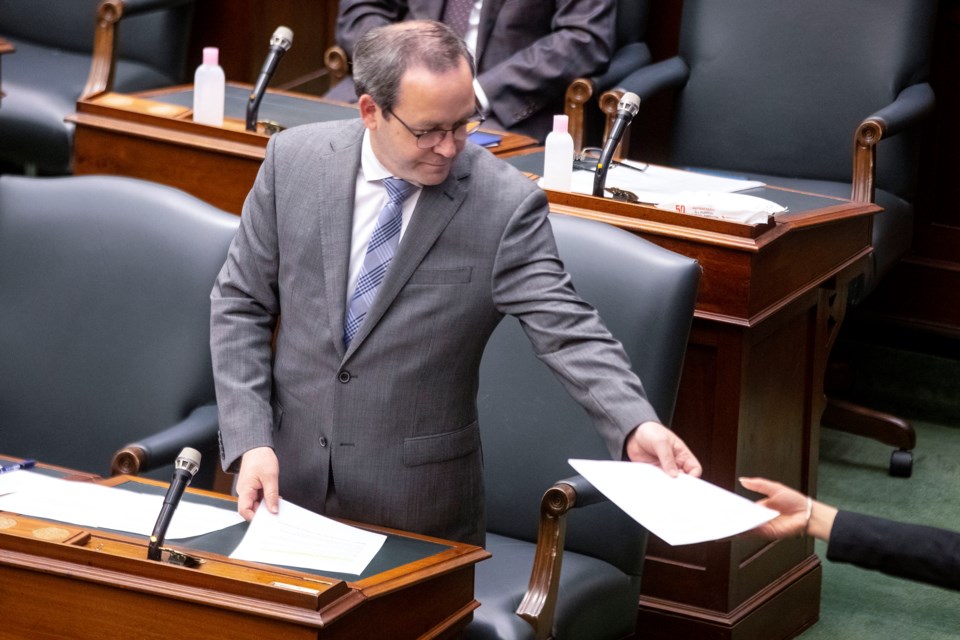The Landlord and Tenant Board now has enough staff. They just need to be trained up and set loose, Ontario's attorney general says.
A search for 40 new adjudicators — doubling the current number — was completed seven to 10 days ago, Doug Downey told the Standing Committee on Justice Policy on Wednesday as he faced questions from opposition MPPs over his ministry's estimates.
The new hires are undergoing training and will soon be on the job, he said, to hopefully speed up the disastrously clogged tribunal.
An ombudsman report recently vindicated landlord and tenant complaints that the LTB was facing months- and years-long delays, causing unsafe living situations and mountains of debt.
Asked by NDP MPP Kristyn Wong-Tam, Downey wouldn't commit to adopting the 61 recommendations in the report, including faster appointments, a triage process for urgent hearings, and real-time technical assistance for hearings, which are now all virtual.
The government is taking action on some of the recommendations, he said. He refused to say whether he would recommend all of them and didn't provide a timeline for when any may be implemented.
Downey's deputy attorney general, David Corbett, said most of the recommendations, but not all, are appropriate. Corbett said he had a good discussion with the ombudsman about how to get them in place.
Liberal MPP Lucille Collard said she's had constituents reach out to complain about the virtual-only tribunals. Lots of people don't have the technological know-how, or a fast enough internet connection, to keep up, she said.
Some community lawyers back that up, saying eliminating in-person hearings has worsened timelines because of those disruptions.
Downey said based on "informal" numbers from the federal "Social Services Tribunal," only about 3-3.5 per cent of people request an in-person hearing. (There is no Social Services Tribunal, but there is a Social Security Tribunal. Downey's office didn't immediately respond to a request for clarification.)
“So people are pretty satisfied with virtual,” he said.
Ontario has also realized "huge savings" from lawyers being able to appear in multiple virtual courtrooms around the province in a single day, he said.
Another problem with virtual hearings, Collard said, is that much of the work at tribunals is often done informally, with lawyers and paralegals striking deals in hallways. But the chat function is turned off in virtual hearings, making that type of work harder, she said.
Downey said he didn't know why that decision was made, but agreed that informal resolution routes are important. He said he'd ask about that and get back to her.
Later, NDP MPP John Vanthof tried to get Downey to say how much the government has spent on its various high-profile court cases, including protecting its mandate letters, fighting for gas pump stickers and appealing the carbon backstop case to the Supreme Court.
Downey said that information might be privileged. He promised to get back to Vanthof either way.
The attorney general also rebuffed another Wong-Tam question about how many staff the province needs for the new Toronto courthouse. Corbett said it had "teething problems" at first due to staff absences, but that the province is working it out.
Wong-Tam repeated the question and Downey said, "We have the appropriate number." It's impossible to say how many staff a courthouse needs to function since it depends on how many hearings the judges schedule, he said.
Wong-Tam also asked if Downey could assure the public that no more trials would be disrupted or delayed because of "Zoom-bombing" — where trolls join video calls and often share pornography, racist images or other generally awful stuff.
Downey said he didn't know if statistics were kept on the number of bombings. While safeguards are in place, he said he couldn't guarantee it wouldn't happen again.
"Bad people will do bad things," he said.
